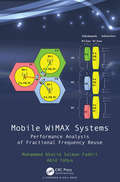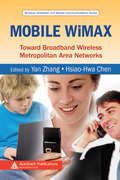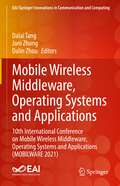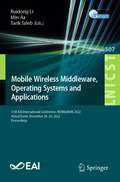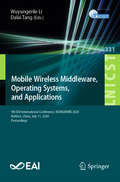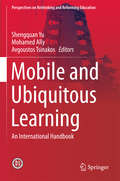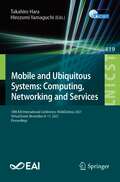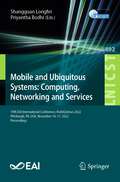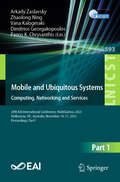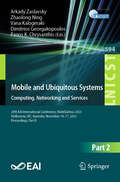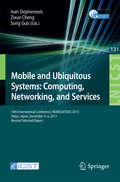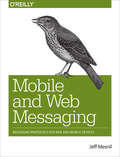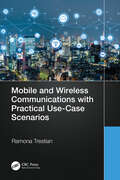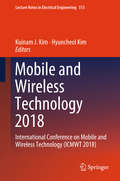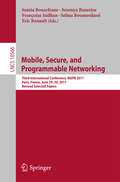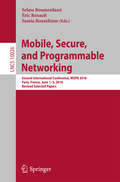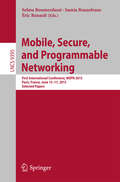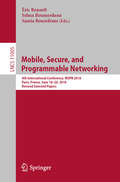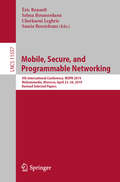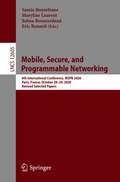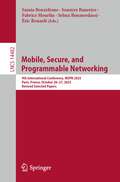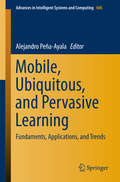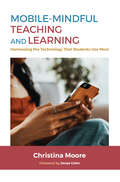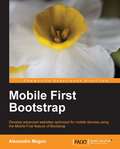- Table View
- List View
Mobile WiMAX Systems: Performance Analysis of Fractional Frequency Reuse
by Abid Yahya Mohammed Khalid FadhilThis book presents new models to enhance both capacity and coverage area in WiMAX FFR cellular network by considering the effect of interference of 18 base stations on the cell border users. The concepts provide a solid scientific base for analyzing and understanding WiMAX technology. This book enables the audience or researchers to understand the concept of the FFR technique. These basic concepts represent the important features of WiMAX technology which have been used to create new algorithms.
Mobile WiMAX: Toward Broadband Wireless Metropolitan Area Networks (Wireless Networks And Mobile Communications Ser.)
by Yan Zhang Hsiao-Hwa ChenThe Wireless Metropolitan Area Network (WirelessMAN) is a promising Broadband Wireless Access (BWA) technology that provides high-speed, high-bandwidth efficiency and high-capacity multimedia services for both residential and enterprise applications. Mobile WiMAX: Toward Broadband Wireless Metropolitan Area Networks examines the basic concepts, rec
Mobile Wireless Middleware, Operating Systems and Applications: 10th International Conference on Mobile Wireless Middleware, Operating Systems and Applications (MOBILWARE 2021) (EAI/Springer Innovations in Communication and Computing)
by Dalin Zhou Dalai Tang Joni ZhongThis book presents the proceedings of the 10th International Conference on Mobile Wireless Middleware, Operating Systems and Applications (MOBILWARE 2021), held virtually in a live stream. The papers included contribute to organized topics of 5G wireless communication, wireless sensor networks, knowledge extraction, instantaneous availability, complex networks, computer vision for mobile application, and mobile support robots. The research presents both theoretically and experimentally based topics. The work particularly benefits researchers, graduate students, and engineers who are interested in related technique improvement ranging from communication middleware and operating systems to networking protocols and applications.Presents the proceedings of the 10th International Conference on Mobile Wireless Middleware, Operating Systems and Applications (MOBILWARE 2021);Topics include 5G wireless communication, wireless sensor networks, knowledge extraction, and instantaneous availability;Relevant to researchers, students, and engineers involved in wireless technology and its applications.
Mobile Wireless Middleware, Operating Systems and Applications: 11th EAI International Conference, MOBILWARE 2022, Virtual Event, December 28-29, 2022, Proceedings (Lecture Notes of the Institute for Computer Sciences, Social Informatics and Telecommunications Engineering #507)
by Min Jia Tarik Taleb Ruidong LiThis book constitutes the refereed conference proceedings of the 11th International Conference on Mobile Wireless Middleware, Operating Systems and Applications, MOBILWARE 2022, via Virtual Event on 28-29, 2022 Due to COVID-19 pandemic the conference was held virtually. The 23 revised full papers were reviewed and selected from 59 submissions and are organized in tracks on Middleware, Wireless, and Future Networks; Integrated Satellite-Terrestrial Information Network; and Integrated Satellite-Terrestrial Intelligent Information Processing, Decision and Planning.
Mobile Wireless Middleware, Operating Systems and Applications: 9th EAI International Conference, MOBILWARE 2020, Hohhot, China, July 11, 2020, Proceedings (Lecture Notes of the Institute for Computer Sciences, Social Informatics and Telecommunications Engineering #331)
by Wuyungerile Li Dalai TangThis book constitutes the refereed conference proceedings of the 9th International Conference on Mobile Wireless Middleware, Operating Systems and Applications, MOBILWARE 2020, held in Hohhot, China, in July 2020. Due to COVID-19 pandemic the conference was held virtually. The 21 revised full papers were reviewed and selected from 69 submissions and are organized in tracks on MobilWare; Big data, data mining and artificial intelligence workshop; Blockchain and internet of things workshop.
Mobile and Ubiquitous Learning
by Mohamed Ally Shengquan Yu Avgoustos TsinakosThis book explores the latest trends and technologies in the field of mobile and ubiquitous learning. It highlights best practices in technology-enhanced learning, and explores how new technologies such as mobile, augmented and wearable technologies are shaping instructional design strategies and the content curriculum development process. The book consists of approximately 20 chapters, written by international experts in the field of mobile and ubiquitous learning. The authors hail from Austria, Brazil, Canada, China, Greece, India, Malaysia, Mauritius, Saudi Arabia, Spain, Sweden, and the United Kingdom. Topics covered include but are not limited to: Use of social media in mobile learning, Contexts of learning and challenges of mobility: Designing for formal, informal, and non-formal learning, Mobile virtual reality: a promising technology to change the way we learn and teach, Mobile applications for encyclopedias, Ethical considerations in the incorporation of mobile and ubiquitous technologies into teaching and learning, Use of augmented reality in mobile learning for students with disabilities, Using wearable technology to support transfer of expertise, and Core technologies in mobile learning. Providing valuable insights on the future of education and the upcoming pedagogies that will be applied in traditional, distance and blended learning, the book offers educators and stakeholders essential guidance in making innovations for the new generations of learners in the 21st century.
Mobile and Ubiquitous Systems: 18th EAI International Conference, MobiQuitous 2021, Virtual Event, November 8-11, 2021, Proceedings (Lecture Notes of the Institute for Computer Sciences, Social Informatics and Telecommunications Engineering #419)
by Takahiro Hara Hirozumi YamaguchiThis book constitutes the refereed post-conference proceedings of the 18th International Conference on Mobile and Ubiquitous Systems: Computing, Networking and Services, MobiQuitous 2021, which was held in November 2021. The conference was held virtually due to the COVID-19 pandemic.The 37 full papers were carefully reviewed and selected from 79 submissions and present discussions, interaction and exchange of experiences that will designate future research efforts and directions. Topics addressed by the conference include systems, applications, social networks, middleware, networking, sensing, data management, data processing and services, all with special focus on mobile and ubiquitous computing.
Mobile and Ubiquitous Systems: 19th EAI International Conference, MobiQuitous 2022, Pittsburgh, PA, USA, November 14-17, 2022, Proceedings (Lecture Notes of the Institute for Computer Sciences, Social Informatics and Telecommunications Engineering #492)
by Shangguan Longfei Priyantha BodhiThis book constitutes the refereed post-conference proceedings of the 19th International Conference on Mobile and Ubiquitous Systems: Computing, Networking and Services, MobiQuitous 2022, which was held in Pittsburgh, November 14-17, 2022. The conference was held virtually due to the COVID-19 pandemic.The 26 full and 2 short papers were carefully reviewed and selected from 95 submissions and present discussions, They were organized in topical sections as follows: Internet of Things (IoT), Security and Privacy, Human-centric sensing, Drone applications and edge computing, Wireless networks, Mobile and human computer interactions, Poster and demo sessions, Technology for health
Mobile and Ubiquitous Systems: 20th EAI International Conference, MobiQuitous 2023, Melbourne, VIC, Australia, November 14–17, 2023, Proceedings, Part I (Lecture Notes of the Institute for Computer Sciences, Social Informatics and Telecommunications Engineering #593)
by Arkady Zaslavsky Dimitrios Georgakopoulos Panos K. Chrysanthis Vana Kalogeraki Zhaolong NingThese two-volume proceedings constitute the refereed post-conference proceedings of the 20th EAI International Conference on Mobile and Ubiquitous Systems: Computing, Networking and Services, MobiQuitous 2023, held in Melbourne, Australia, during November 14-17, 2023. The 65 papers presented in these proceedings were carefully reviewed and selected from 161 submissions. The conference papers are organized in topical sections on: Part I - Tracking and Detection; IoT; Federated learning; Networks; Activity recognition; Security Management; Urban/Mobile Crowdsensing. Part II - Urban/Mobile Crowdsensing; Edge computing; Crowdsourcing, Platforms and localization; Activity recognition and prediction; AI and machine learning; Mobile edge and fog computing; Mobile augmented reality and applications for mobile computing; interaction technologies; AutoQuitous workshop.
Mobile and Ubiquitous Systems: 20th EAI International Conference, MobiQuitous 2023, Melbourne, VIC, Australia, November 14–17, 2023, Proceedings, Part II (Lecture Notes of the Institute for Computer Sciences, Social Informatics and Telecommunications Engineering #594)
by Arkady Zaslavsky Dimitrios Georgakopoulos Panos K. Chrysanthis Vana Kalogeraki Zhaolong NingThese two-volume proceedings constitute the refereed post-conference proceedings of the 20th EAI International Conference on Mobile and Ubiquitous Systems: Computing, Networking and Services, MobiQuitous 2023, held in Melbourne, Australia, during November 14-17, 2023. The 65 papers presented in these proceedings were carefully reviewed and selected from 161 submissions. The conference papers are organized in topical sections on: Part I - Tracking and Detection; IoT; Federated learning; Networks; Activity recognition; Security Management; Urban/Mobile Crowdsensing. Part II - Urban/Mobile Crowdsensing; Edge computing; Crowdsourcing, Platforms and localization; Activity recognition and prediction; AI and machine learning; Mobile edge and fog computing; Mobile augmented reality and applications for mobile computing; interaction technologies; AutoQuitous workshop.
Mobile and Ubiquitous Systems: Computing, Networking, and Services
by Ivan Stojmenovic Song Guo Zixue ChengThis book constitutes the thoroughly refereed post-conference proceedings of the 10th International ICST Conference on Mobile and Ubiquitous Systems: Computing, Networking, and Services, MobiQuitous 2013, held in Tokyo, Japan, in December 2013. The 67 revised full papers presented were carefully reviewed and selected from 141 submissions. The papers and 2 invited talks cover a wide range of topics such as mobile applications, social networks, networking, data management and services.
Mobile and Web Messaging
by Jeff MesnilLearn how to use messaging technologies to build responsive and resilient applications for mobile devices and web browsers. With this hands-on guide, you'll use the STOMP and MQTT messaging protocols to write iOS and web applications capable of sending and receiving GPS and device sensor data, text messages, and alerts.Messaging protocols are not only simple to use, but also conserve network bandwidth, device memory, and batteries. Using this book's step-by-step format, author Jeff Mesnil helps you work with Objective-C and JavaScript libraries, as well as the protocols. All you need to get started are basic programming skills.Understand basic messaging concepts and compositionLearn two common messaging models: point-to-point and publish/subscribeUse STOMP to write an iOS application that sends GPS data, and a web app that consumes the dataBuild an iOS app with MQTT that tracks and broadcasts device motion data, and a web app that displays the data and sends alertsExtend STOMP to filter, prioritize, persist, and expire messagesTake a complete tour of STOMP and MQTT, including features not used in the book's sample apps
Mobile and Web Messaging: Messaging Protocols for Web and Mobile Devices
by Jeff MesnilLearn how to use messaging technologies to build responsive and resilient applications for mobile devices and web browsers. With this hands-on guide, you’ll use the STOMP and MQTT messaging protocols to write iOS and web applications capable of sending and receiving GPS and device sensor data, text messages, and alerts.Messaging protocols are not only simple to use, but also conserve network bandwidth, device memory, and batteries. Using this book’s step-by-step format, author Jeff Mesnil helps you work with Objective-C and JavaScript libraries, as well as the protocols. All you need to get started are basic programming skills.Understand basic messaging concepts and compositionLearn two common messaging models: point-to-point and publish/subscribeUse STOMP to write an iOS application that sends GPS data, and a web app that consumes the dataBuild an iOS app with MQTT that tracks and broadcasts device motion data, and a web app that displays the data and sends alertsExtend STOMP to filter, prioritize, persist, and expire messagesTake a complete tour of STOMP and MQTT, including features not used in the book’s sample apps
Mobile and Wireless Communications with Practical Use-Case Scenarios
by Ramona TrestianThe growing popularity of advanced multimedia-rich applications along with the increasing affordability of high-end smart mobile devices has led to a massive growth in mobile data traffic that puts significant pressure on the underlying network technology. However, no single network technology will be equipped to deal with this explosion of mobile data traffic. While wireless technologies had a spectacular evolution over the past years, the present trend is to adopt a global heterogeneous network of shared standards that enables the provisioning of quality of service and quality of experience to the end-user. To this end, enabling technologies like machine learning, Internet of Things and digital twins are seen as promising solutions for next generation networks that will enable an intelligent adaptive interconnected environment with support for prediction and decision making so that the heterogeneous applications and users' requirements can be highly satisfied. The aim of this textbook is to provide the readers with a comprehensive technical foundation of the mobile communication systems and wireless network design, and operations and applications of various radio access technologies. Additionally, it also introduces the reader to the latest advancements in technologies in terms of Internet of Things ecosystems, machine learning and digital twins for IoT-enabled intelligent environments. Furthermore, this textbook also includes practical use-case scenarios using Altair WinProp Software as well as Python, TensorFlow and Jupyter as support for practice-based laboratory sessions.
Mobile and Wireless Technology 2018: International Conference on Mobile and Wireless Technology (ICMWT 2018) (Lecture Notes in Electrical Engineering #513)
by Kuinam J. Kim Hyuncheol KimThis book presents peer-reviewed contributions from the 5th International Conference on Mobile and Wireless Technology (ICMWT 2018), held June 25-27, 2018 in Hong Kong. This conference provided researchers and practitioners from both academia and industry with a platform to keep them abreast of cutting-edge developments in the field. The book includes papers on mobile and wireless networks and their applications, the increasingly important security issues relating to mobile and wireless systems, data management, as well as the latest developments in mobile software development, and multimedia and wireless communications.
Mobile, Secure, and Programmable Networking
by Selma Boumerdassi Samia Bouzefrane Soumya Banerjee Françoise Sailhan Eric RenaultThis book constitutes the thoroughly refereed post-conference proceedings of the First International Conference on Mobile, Secure, and Programmable Networking, MSPN 2015, held in Paris, France, in June 2015. The 14 papers presented in this volume were carefully reviewed and selected from 36 submissions. They discuss new trends in networking infrastructures, security, services and applications while focusing on virtualization and cloud computing for networks, network programming, software defined networks (SDN) and their security.
Mobile, Secure, and Programmable Networking
by Selma Boumerdassi Samia Bouzefrane Éric RenaultThis book constitutes the thoroughly refereed post-conference proceedings of the First International Conference on Mobile, Secure, and Programmable Networking, MSPN 2015, held in Paris, France, in June 2015. The 14 papers presented in this volume were carefully reviewed and selected from 36 submissions. They discuss new trends in networking infrastructures, security, services and applications while focusing on virtualization and cloud computing for networks, network programming, software defined networks (SDN) and their security.
Mobile, Secure, and Programmable Networking
by Selma Boumerdassi Samia Bouzefrane Éric RenaultThis book constitutes the thoroughly refereed post-conference proceedings of the First International Conference on Mobile, Secure, and Programmable Networking, MSPN 2015, held in Paris, France, in June 2015. The 14 papers presented in this volume were carefully reviewed and selected from 36 submissions. They discuss new trends in networking infrastructures, security, services and applications while focusing on virtualization and cloud computing for networks, network programming, software defined networks (SDN) and their security.
Mobile, Secure, and Programmable Networking: 4th International Conference, MSPN 2018, Paris, France, June 18-20, 2018, Revised Selected Papers (Lecture Notes in Computer Science #11005)
by Selma Boumerdassi Samia Bouzefrane Éric RenaultThis book constitutes the thoroughly refereed post-conference proceedings of the 4th International Conference on Mobile, Secure, and Programmable Networking, held in Paris, France, in June 2018. The 27 papers presented in this volume were carefully reviewed and selected from 52 submissions. They discuss new trends in networking infrastructures, security, services and applications while focusing on virtualization and cloud computing for networks, network programming, software defined networks (SDN) and their security.
Mobile, Secure, and Programmable Networking: 5th International Conference, MSPN 2019, Mohammedia, Morocco, April 23–24, 2019, Revised Selected Papers (Lecture Notes in Computer Science #11557)
by Selma Boumerdassi Samia Bouzefrane Éric Renault Cherkaoui LeghrisThis book constitutes the thoroughly refereed post-conference proceedings of the 5th International Conference on Mobile, Secure and Programmable Networking, held in Mohammedia, Morocco, in April 2019. The 23 papers presented in this volume were carefully reviewed and selected from 48 submissions. They discuss new trends in networking infrastructures, security, services and applications while focusing on virtualization and cloud computing for networks, network programming, software defined networks (SDN) and their security.
Mobile, Secure, and Programmable Networking: 6th International Conference, MSPN 2020, Paris, France, October 28–29, 2020, Revised Selected Papers (Lecture Notes in Computer Science #12605)
by Selma Boumerdassi Samia Bouzefrane Eric Renault Maryline LaurentThis book constitutes the thoroughly refereed post-conference proceedings of the 6th International Conference on Mobile, Secure and Programmable Networking, held in Paris, France, in October 2020.The 16 full papers presented in this volume were carefully reviewed and selected from 31 submissions. They discuss new trends in networking infrastructures, security, services and applications while focusing on virtualization and cloud computing for networks, network programming, software defined networks (SDN) and their security.
Mobile, Secure, and Programmable Networking: 9th International Conference, MSPN 2023, Paris, France, October 26–27, 2023, Revised Selected Papers (Lecture Notes in Computer Science #14482)
by Selma Boumerdassi Samia Bouzefrane Éric Renault Soumya Banerjee Fabrice MourlinThis book constitutes the refereed post-proceedings of the 9th International Conference on Mobile, Secure, and Programmable Networking, MSPN 2023, held in Paris, France, during October 26–27, 2023.The 15 full papers included in this book were carefully reviewed and selected from 31 submissions. They were organized in topical sections as follows vertical tools on machine leaning and artificial intelligence, network programming and Cloud computing, Industrial Internet of things, Digital Twins and Security.
Mobile, Ubiquitous, and Pervasive Learning
by Alejandro Peña-AyalaThis book is concerned with the mobile, ubiquitous,and pervasive learning arena. Itpresent a collection of works corresponding to four categories: reviews,studies, conceptual proposals, and approaches. As a result of the submissionand revision processes eight manuscripts were accepted and organized into theaforementioned four parts as follows: ·Review: a couple of chapters offer asurvey of related works. One concerns with the diversity of mobile, ubiquitous,and pervasive labor, where interested findings are unveiled based oncorrelations. Other focuses on adaptive and adaptable architectures that aresuitable to implement ubiquitous learning sceneries, whose contributionrepresents a model of a domain specific architecture. ·Studies: two chapters explore issuesrelated to the effect of question styles made through smartphones and tablets,and the disposition of teachers to exploit mobile devices at classroom. ·Conceptual: a pair of chapters offer agiven proposal, the first to develop adaptive mobile learning systems by meansof a framework based on contextual information; and the second with the purposeto share some guidelines of how to apply cloud computing in the development andoperation of mobile. ·Approaches: two chapters apply aspecific paradigm as part of a whole application and reveal the achievedimpact. One of them uses augmented reality to encourage children to learn abouttrees as context-sensitive informal learning. The other, immerses children inplaying a learning game to learn math by cooperating between members team andinteracting through mobile devices. This volume will be a source of interest forresearchers, practitioners, professors, and postgraduate students aimed atupdating their knowledge and finding targets for future work in the mobile,ubiquitous, and pervasive learning field!
Mobile-Mindful Teaching and Learning: Harnessing the Technology That Students Use Most
by Christina MooreThis book provides faculty and instructors with an introductory guide to integrating mobile learning in their courses. Recognizing that a smartphone is the first and main piece of technology anyone owns, with ownership exceeding 95% for those aged 18-29, with a sizable minority of these being smartphone-dependent; and that instructors are relying on technology for teaching and learning more than ever; this book addresses the imperative that course materials and interactions be increasingly available through the technology that students use most often. Dispelling the notion that mobile learning is for the tech-savvy and adventurous, mobile-mindful teaching offers teachers a way to take a few steps at a time, share options with students, and progressively develop ideas and practices. The book invites you to explore your own way into mobile learning.Christina Moore stresses two principles as you engage with mobile learning--intention and fluidity. This begins with mindfully implementing mobile learning opportunities so that students see the usefulness of learning via phone; and recognizing the fluid learning environments in which students learn so you can offer online modalities and functions appropriate to purpose and situations.The book opens with a “start with self” section on How to Be a Mobile Mindful Learner, offering ideas on exploring the almost infinite available online resources in your discipline to curate a rich and ever-expanding compilation of ideas for use in your scholarly work and teaching; and identifying different types of learning (digital reading, audio and visual learning, and social learning) across multiple devices and contexts to consider as you develop your course.The section “Toward Mobile-Mindful Teaching” explores ways to add mobile options to existing learning materials and how they and the LMS functions you use are rendered on a phone by taking a mobile test drive through your course.Christina Moore shows how, by building up your mobile learning skills to be a more productive scholar and developing habits that feed your curiosity and creativity, you can start planning how you can create fluid learning opportunities for your students they can access across devices, time, and space, and take advantage of found moments of time and informal spaces.
Mobile-first Bootstrap
by Alexandre MagnoA practical, step-by-step tutorial on developing websites for mobile using Bootstrap.This book is for anyone who wants to get acquainted with the new features available in Bootstrap 3 and who wants to develop websites with the mobile-first feature of Bootstrap. The reader should have a basic knowledge of Bootstrap as a frontend framework.
